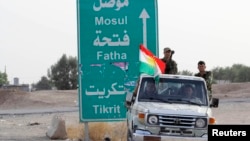The man nominated to be Iraq's new oil minister is a Kurdish petroleum geologist who could end a bitter dispute with the northern self-rule region and free up more oil exports through a pipeline to Turkey.
Nizar Saleem Numan, named as oil minister in Prime Minister Haider al-Abadi's new lineup of ministers, told Reuters in an interview he was "hopeful the differences could be resolved" between Baghdad and the Kurdish Regional Government (KRG).
Should Numan's appointment be approved by parliament, "he will certainly serve to facilitate a deal with Kurds and the central government," said political analyst Hisham al-Hashimi.
"He is also a very experienced person in the oil industry and known for his integrity."
Numan, 65, is the dean of the college of planning at the University of Duhok in the Kurdish region and spent three decades at the University of Mosul, the largest city in northern Iraq, now under control of Islamic State militants.
He told Reuters that he had also worked as a consultant for oil companies in both the northern Kurdish region and the rest of Iraq.
The dispute with the Kurds involves an agreement for the KRG to transfer to Iraq's central state oil marketing company 550,000 barrels a day of crude produced in the Kurdish region, in return for a 17 percent share in the federal budget.
The Kurds, seeking more autonomy from Baghdad to export their own oil, halted all oil transfers to the Iraqi government in September 2015, instead shipping crude independently. They stopped receiving government funding, according to the outgoing oil minister Adel Abdul Mahdi.
Mahdi said in March the central government would not resume pumping crude through a Kurdish pipeline to Turkey unless it reached a financial agreement with the KRG.
Baghdad's state-run North Oil Company previously fed 150,000 barrels a day into the pipeline, which carries crude from the Kirkuk fields and other reservoirs managed by the Kurdish authorities to the Turkish port of Ceyhan on the Mediterranean Sea.
The situation has been further complicated by the presence of Islamic State militants in northern Iraq who have allowed the Kurds to expand their control over the oil producing region of Kirkuk.
Production freeze
Abadi presented his new cabinet of technocrats on Thursday and now awaits a response from parliament, which must vote on the reshuffle in the next 10 days.
Some lawmakers fear Abadi's proposals would undermine the patronage networks that have sustained the wealth and influence of Iraq's political class for more than a decade.
In his interview with Reuters late on Thursday, Numan said should his appointment be confirmed, he would also pursue sustainable development of the OPEC nation's crude reserves, which are among the world's largest.
He will take over the oil ministry at a time when Iraq and other producers are grappling with the fallout from low crude prices, which have put acute strain on Baghdad's finances.
Iraq was the source of OPEC's largest crude supply growth in 2015 with a production in excess of four million barrels per day that makes the nation the second-largest producer of the 13-member group, after Saudi Arabia.
Asked whether he expected to attend a meeting in Doha on April 17 where OPEC and non-OPEC members are set to discuss a production freeze aimed at propping up oil prices, Numan said he could not be sure until parliament ratified his nomination.
A ministry spokesman told Reuters on March 22 that Iraq planned to attend the meeting and considered the proposal of freezing output "a step in the right direction."





